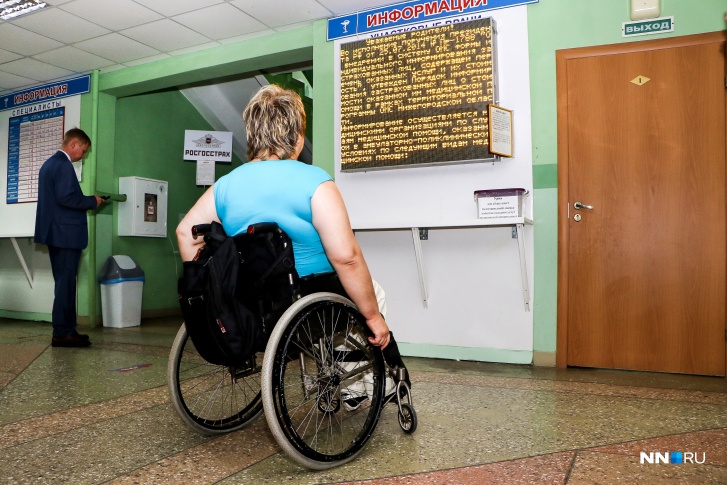"Snow Blocks Are Too Confusing". Nizhny Novgorod residents with disabilities spoke about the accessible environment in the city on the eve of the anniversary
Nizhny Novgorod disabled people spoke about the problems in the city before its 800th anniversary
More than 300 thousand people with disabilities. Sometimes they face misunderstandings and difficulties in finding a job.. The editors of NN.RU talked to several of them, to understand if it is convenient for them to live in the city, which celebrates its 800th anniversary this year.
Andrey Bulanov lost all his fingers. He lost them to frostbite in an accident.. Now he is the chairman of the society of disabled people "Invatur" and provides assistance to those, who recently received a disability.
- People, who became disabled, are shocked by a new diagnosis, lack of knowledge of terminology, special organizations, who can help, and get depressed, because they do not want to accept the new reality. They may lose their will to live, if you do not provide them with deep psychological help. A person essentially starts a new life.. He becomes practically a newborn: he has to re-learn to do all that, what I already knew before. Many are afraid of this helplessness, ignorance of that, what will happen next, - says Bulanov.
Psychologist for "tick"
One of the first, who does the person see, disabled by accident, is a psychologist at the hospital. According to Bulanov, many patients do not believe them, because they think, that they talk to them insincerely, "for check", and unable to understand them. The Chairman of Invatura is convinced, that already at this stage people need to be told about such societies of people with disabilities. They will be able to support and advise "newbies".
Everyone reacts differently to their situation.. While some fall into despair, others - vice versa, instantly set a goal to get "on their feet", minimize the effects of injury or illness, possibly, even completely heal. Someone starts borrowing money for rehabilitation in Moscow or abroad. According to Bulanov, such people are often disappointed too: rehabilitation is not quick. Lack of quick results often destroys people's hope for a normal life..
According to Andrey Bulanov, in such situations, psychologists and psychotherapists are still needed - so as not to fall into depression. This is especially important for those, who closed in himself for a long time and does not leave the house.
People with endless possibilities
- We, in Russia, accepted, that people with disabilities need to be treated “like a doctor”. They only need to be treated, the main thing, so that he does not have any additional complications. But here we need, rather, A complex approach: don't forget about medicine, but it is also important to focus on the soul, - adds Andrey Bulanov.

This is how icons look for blind people.. They are made by Ivan Ilyin - a member of the Nizhny Novgorod Society of Disabled People
A photo: Rebecca Wendy
In Russia, for a long time they could not find the right term, to denote people with disabilities. They used to be called simply disabled. (from English. invalid - disabled, sick, not valid), but at the beginning of the 2000s, the West began to abandon this term. Then in Russia they came up with the wording "people with disabilities", who later transformed into "disabled people". Now the most neutral is the wording "people with disabilities".
"Wheelchair users love to dance"
Accessibility of the urban environment for people with disabilities can be discussed since the early 2010s. Before that, they were either simply expelled from the city. (read about "Stalinist samovars", if you have strong nerves. — Note. ed.), or were limited to welding primitive ramps to the porch of the house, where does the person live.
IN 2009 of the year in Nizhny Novgorod, Ekaterina Demina was not allowed into a nightclub. The club administrator argued his position with the topics, what worried about the safety of the girl in the wheelchair. Despite, that she was with the attendants, who were ready to help her if necessary.
Discos and parties are also held in disabled people's societies, although some still try to get on the dance floor of the "for all" clubs.
- In fact, in Nizhny, many wheelchair children love to dance. They order themselves special strollers for this.. Some people like to play basketball, someone - bocci (paralympic sport, aiming to hit the ball accurately, a bit like bowling. — Note. ed.). There are strollers for different types of activity, - explains Bulanov.
In Nizhny Novgorod at the moment there are several fitness centers and sports clubs, which are equipped with special lifts, showers, swimming pools and fitness equipment, which people with disabilities can visit. Many of them are very fond of sports and an active lifestyle..
Discos are not a hindrance for the deaf
Ilya Galkin does not hear from birth. He plays hockey professionally with the deaf team., is a fan of the football club "Torpedo" and often attends their matches. Now his dream is to go abroad, to participate in an international ice hockey match for the hearing impaired. He also wants to travel with his family as much as possible..
Sometimes in free time, Ilya Galkin and his wife go to discos, to unwind, and on his page there are a lot of collections with music:
- Yes, I can't hear the music itself, but I feel vibrations, music mood, that's why it's important for me, to have a lot of bass. And my wife is hard of hearing, she can hear music at high volume, better understand her mood. It doesn't matter so much to her, that's why she finds most of the music selections.
The chairman of "Invatura" considers, what about the FIFA World Cup in 2018 year, great progress has been made in the accessible environment: made lifts at the airport, at the train station. However, he notes with regret, that people with disabilities find it difficult to engage in river tourism - and this is rather strange in a city at the confluence of two rivers.
Beautification
According to experts, problems with the accessible environment often begin within the apartment.
- We want, so that in new buildings at least the doors to the toilet are created wide. Into a door wide 60 centimeters, the stroller will definitely not pass, and at the door 80 centimeters - calmly, at worst, at least 70 centimeters. Technically, there are no obstacles for the construction of wide doorways.. Everyone just got used to Soviet standards, - explains the chairman of "Invatur" Bulanov.
Bulanov reports, that in response to their demand to build houses with wider openings, it is often proposed to build special houses for the disabled. In his opinion, it looks more like segregation. This practice was popular during the Soviet era., when special "blind" houses were built for the society of the blind.
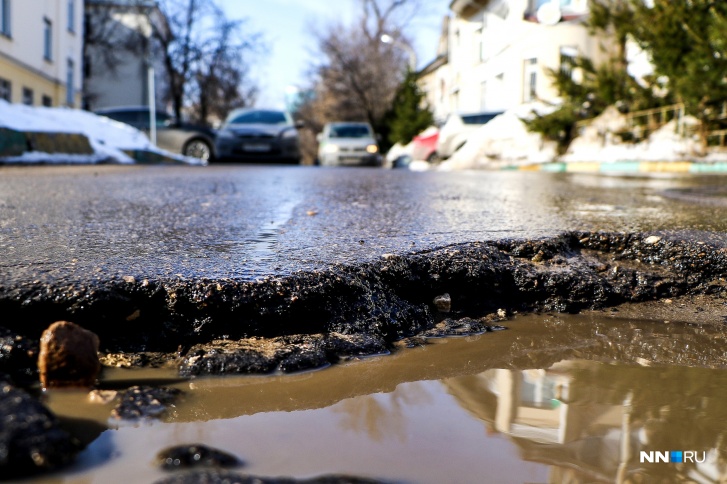
Even a small pit can disorient a blind person.
A photo: Natalia Burukhina
Big problems for people with limited mobility are caused by the work of DUKs and irresponsible homeowners' associations. The disadvantages of their work were especially evident this winter., when uncleared snow lay in the yards for almost two months. The blind and visually impaired are greatly disorienting, and it is difficult for people with limited mobility to pass even with accompanying persons.
"Learn Russian Sign Language"
Some difficulties are encountered by hearing impaired and blind people in banks, MFC and courts - not always enough equipment and skilled workers for this.
Deaf Ilya Galkin claims, which quickly establishes contact with customers: food delivery does not require a lot of communication. Galkin's problems appear in organizations and emergency services, when you need to solve more complex issues. Then it is much more difficult to do without a sign language interpreter..
Society of the Deaf highlights 40 free hours per year for sign language interpreter services. Galkin says, that there are almost never enough of them. Hospitals, banks, courts are the most time-consuming organizations. As Ilya Galkin says, many deaf and hard of hearing residents of Nizhny Novgorod are now trying to achieve an increase in the number of free hours.
The man explains, that it is possible to establish contact with the hearing impaired without an interpreter. To do this, you just need to speak more clearly - the deaf person will be able to understand you by your facial expressions and articulation..
- In general, my main advice to everyone is to learn Russian sign language, so that there are no problems with misunderstanding, - adds Galkin.
Inclusive education
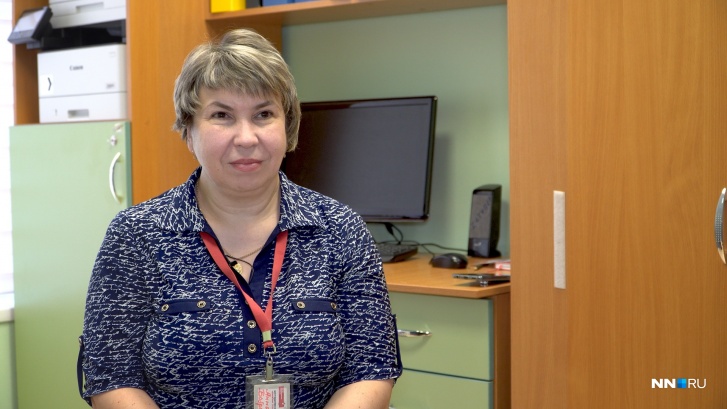
A photo: Alexander Kartashov
Inclusive education is a form of learning, according to which everyone has the right and the opportunity to study in educational institutions, regardless of physical, mental, social, intellectual and linguistic features.
Anna Bobrova is more 20 years working with children with disabilities (disabilities). She is engaged in the development of inclusive education in the Nizhny Novgorod region. Now she works at the Veras Foundation for the Support of Children with Developmental Disabilities..
Bobrova believes, that Russia has little experience of inclusion in comparison with Western countries. For high-quality development, it requires the joint work of ordinary teachers and teachers of special schools.. The experience of the latter will help teachers find contact with students and build the right training program.
According to a specialist, for an inclusive society, it is necessary to explain to teachers now, other children and parents, how to behave correctly in relation to people with disabilities. Besides, these skills are needed by all school staff - including the attendants.
There are already "lessons of kindness" in the Nizhny Novgorod region, where children are shown various techniques, devices for people with disabilities. They also tell about the rights and opportunities of persons with disabilities., about the benefits of teaching children with disabilities specifically in educational institutions. Such occupations, according to the expert, facilitate acceptance and empathy in children.
There is also an American model of the formation of the correct attitude in children towards people with disabilities.. She means that, that children from general education schools attend correctional, and sometimes up to half of the class in such institutions are children without disabilities. Thus, all the guys blur the boundaries of any differences.
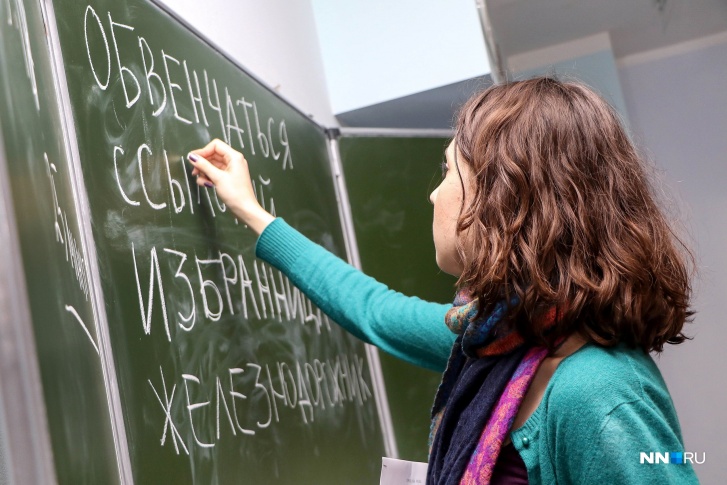
Currently, the educational organizations of the region are working 81 tutor
A photo: Natalia Burukhina
Children with disabilities, besides the regular teacher at school, additional support from a tutor is needed. This is a specialist, who explores interests and creates an environment for the child's development. It does not focus on the needs of the curriculum or educational standard, but on the needs of the student. According to the regional Ministry of Education, now only 81 tutor - people are reluctant to go there, since the requirements are high, and their average salary is about 15-20 thousand. rubles.
Anna Bobrova believes, what is most important for improving the situation of people with disabilities is “to take into account each other's peculiarities and accept people as such, as they are. Because it all begins with acceptance ".
Disability does not always affect the ability to work
Ilya Galkin found it difficult to find a job. He is a dental technician by profession, however at some point he realized, that he wants to change the field of activity. Very often employers offered him low-skilled work: cleaner, janitor and so on. It was necessary to constantly prove, that hearing limitations do not interfere with performance. He ended up finding himself a job as a courier..
- In the society of the deaf, I found an advertisement for a job as a courier in Yandex.Eda. They recently started recruiting Deaf and Hard of Hearing employees.. There is nothing difficult, convenient work schedule and the application itself. At the same time, I got to know the city well, despite, that he was born and spent his whole life in Nizhny Novgorod.
"No one owes nothing to nobody"
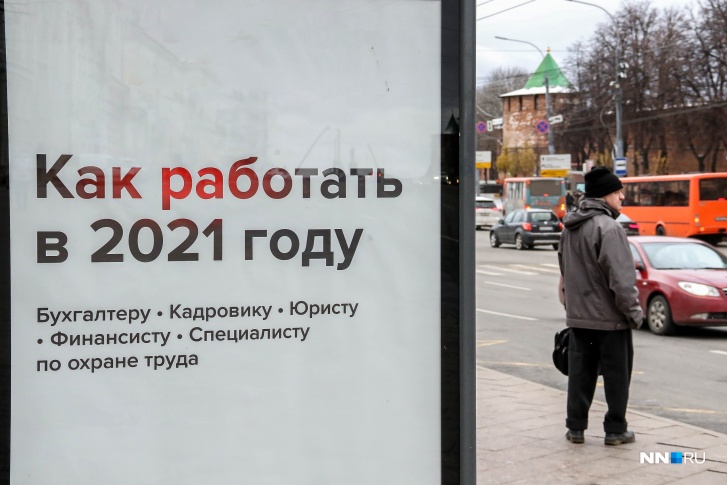
A photo: Natalia Burukhina
Sometimes the problem of unemployment is overprotectiveness.. Often, loved ones try to help people with disabilities once again and show overprotection.. You can quickly get used to it.. According to Bulanov, people in such situations become very infantile:
- In matters of employment, it is important to understand, that no one owes anything to anyone. Some people with disabilities set high standards for their profession themselves. (want, to arrange transportation for them at work, long-term vacation, when they want). It shouldn't be this way. I am an employer myself and I perfectly understand my colleagues in this regard., - Andrey Bulanov comments.
To avoid the effeminacy, the man recommends not to give up social life, educate society about the rights of people with disabilities.
A source: nn.ru

